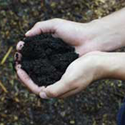What does it mean to grow gardens organically? It depends upon who you talk to. The simple answer is that organic gardeners only use animal or plant-based fertilizers rather than synthetic. It also means use of natural pest control devoid of synthetically manufactured insecticides. In other words, using natural substances and beneficial insects to ward off pests instead of spraying with the backyard equivalent of Malathion. My information on organic vegetable gardening was provided by UF IFAS Extension Publication “Organic Vegetable Gardening” HS 1215.
Why garden organically? Since “USDA Certified Organic” does not apply to home gardening, why would any gardener give up all synthetic fertilizers? And why not use synthetic pesticides, when just one application could eliminate even the most devastating ravages of a crop insect or disease? Why work, so hard handling large quantities or organic soil amendments and manures when synthetic fertilizer of every description and purpose are so quickly available and easy to use?
Early organic gardeners did it to preserve a way of life that reduced pollution and environment decay, thus creating a more ecological society. Organic enthusiasts are extremely health-conscious, and hope that working vigorously outdoors and eating foods free from pesticides just might lead to better nutrition and health.
The biggest differences between organic and conventional gardening are in the area of fertilization and pest control. The organic gardener prefers organic materials and natural methods of dealing with insect problems and fertilizer requirements. The conventional gardener uses a combination of chemically prepared materials and scientific methods in approaching the vegetable garden.
Whichever method you choose, you need to select a plot of good, well-drained soil for planting vegetables. Also, it is important to choose vegetable varieties suited to Florida growing conditions.
Soil preparation is the most important step in organic gardening. Since organic fertilizers and soil conditioning materials work rather slowly, they need to be mixed into the soil at least three weeks ahead of planting time.
To have a successful organic garden, you need to use abundant quantities of organic material, usually in the form of animal manures, cover crops, compost or mixed organic fertilizer. These materials improve the tilth, condition, and structure of the soil. They help the soil hold water and nutrients better. In addition, organic matter supports micro-biological activity in the soil, and contributes major and minor plant nutrients. Another benefit is that as these organic matters decompose, they release acid which help to convert insoluble natural additives, such as ground rock, into forms plants can use.
- Muscadine Grape: a Popular Fruit for North Florida - August 10, 2015
- Southern Field Peas, a Summer Delight - July 14, 2015
- Caterpillars with a Sting - June 10, 2015

